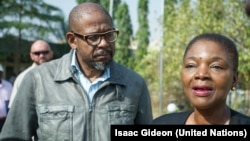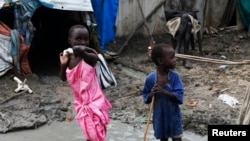A top U.N. official and an award-winning Hollywood actor and UNESCO ambassador warned Monday that unless peace is restored quickly in South Sudan, the country faces a bleak future.
"This is a country which is rich in talent and rich resources. If this conflict continues we will see a generation of South Sudan’s children who are lost,” U.N. Under-Secretary-General and Emergency Relief Coordinator Valerie Amos told reporters in Juba as she and Academy Award-winning actor Forest Whitaker wrapped up a three-day visit to South Sudan.
Whitaker, who is UNESCO's Goodwill Ambassador for Peace and Reconciliation, called "... on all parties to the conflict to put down their arms and work together toward building a sustainable peace for the people of South Sudan.”
Amos and Whitaker met with President Salva Kii and other South Sudanese officials and with foreign ambassadors and aid workers. They also visited camps for Internally Displaced Persons (IDPs) in Juba and Jonglei state. Amos said the people they met in the camps "are desperate for peace and they are tired of living in fear."
Leaders should visit IDP camps
She and Whitaker said South Sudan’s leaders should go to the IDP camps and see for themselves the hardship that the conflict is forcing people to endure. That might be the push that’s needed for them to finally make peace, they said.
According to the U.N. Office for the Coordination of Humanitarian Affairs, two million South Sudanese have fled their homes. Most are displaced inside South Sudan but around half a million have sought refuge in neighboring countries. Around 100,000 are in UN camps for the displaced in South Sudan.
Amos said 2.5 million South Sudanese urgently need food aid, and humanitarian workers are doing their best to reach them. But the aid workers are facing obstacles and security risks as they try to deliver the aid.
"Thirteen humanitarian workers have lost their lives since the conflict began," Amos said. "Many face the fear of kidnapping and have seen their supplies and equipment looted. We are also seeing a worrying trend, which is on the ground. Roadblocks are being suddenly established and demands being made of humanitarian workers that they pay to allow the convoys go through."
Amos said that if the conflict is allowed to continue, "We will see a generation of South Sudan’s children who are lost."
Children suffering
The visit was the second by Amos and Whitaker to South Sudan since the conflict began in December, 2013. Whitaker said he and Amos saw a great deal of suffering during both visits, particularly among children.
“At the Protection of Civilians camp I visited a few months ago in Bentiu and yesterday in Yuai, I saw many children, boys and girls, suffering from malnutrition," Whitaker said. "Throughout the country hundreds of schools remain empty and some have been turned into military camps as thousands of young people go without food, without education."
He called on "all parties to the conflict to put down their arms and work together toward building a sustainable peace for the people of South Sudan.”
President Kiir and his arch-rival in the conflict, rebel leader Riek Machar, reached a power-sharing deal at talks last month in Addis Ababa, but a peace agreement still has to be hammered out. Th East African bloc organization, the Intergovernmental Authority on Development (IGAD) has been trying for more than a year to broker peace in South Sudan. IGAD has given Mr. Kiir and Machar until March 5 to reach a final peace deal.






